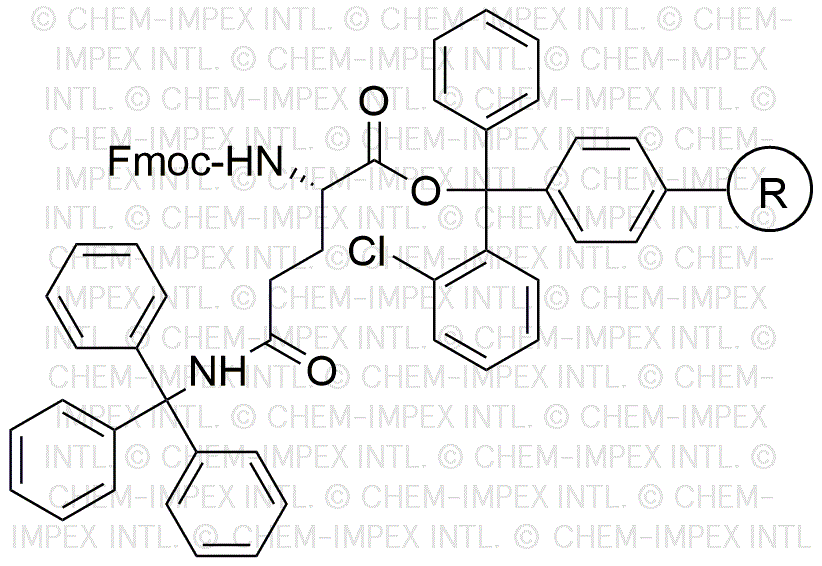Na-Fmoc- Nd-trityl-L-glutamine-2-chlorotrityl resin is widely utilized in research focused on:
- Peptide Synthesis: This resin is essential for solid-phase peptide synthesis, allowing researchers to efficiently create complex peptides for various applications in drug development and biotechnology.
- Drug Discovery: Its ability to facilitate the synthesis of peptide libraries makes it invaluable in the pharmaceutical industry for discovering new therapeutic agents.
- Bioconjugation: The resin can be used to attach peptides to other biomolecules, enhancing the development of targeted therapies and diagnostic tools.
- Protein Engineering: Researchers utilize this resin to create modified peptides that can improve protein stability and functionality, which is crucial in enzyme development and therapeutic proteins.
- Academic Research: It serves as a critical tool in academic laboratories for studying peptide interactions and functions, contributing to advancements in biochemistry and molecular biology.
General Information
Properties
Safety and Regulations
Applications
Na-Fmoc- Nd-trityl-L-glutamine-2-chlorotrityl resin is widely utilized in research focused on:
- Peptide Synthesis: This resin is essential for solid-phase peptide synthesis, allowing researchers to efficiently create complex peptides for various applications in drug development and biotechnology.
- Drug Discovery: Its ability to facilitate the synthesis of peptide libraries makes it invaluable in the pharmaceutical industry for discovering new therapeutic agents.
- Bioconjugation: The resin can be used to attach peptides to other biomolecules, enhancing the development of targeted therapies and diagnostic tools.
- Protein Engineering: Researchers utilize this resin to create modified peptides that can improve protein stability and functionality, which is crucial in enzyme development and therapeutic proteins.
- Academic Research: It serves as a critical tool in academic laboratories for studying peptide interactions and functions, contributing to advancements in biochemistry and molecular biology.
Documents
Safety Data Sheets (SDS)
The SDS provides comprehensive safety information on handling, storage, and disposal of the product.
Product Specification (PS)
The PS provides a comprehensive breakdown of the product’s properties, including chemical composition, physical state, purity, and storage requirements. It also details acceptable quality ranges and the product's intended applications.
Certificates of Analysis (COA)
Search for Certificates of Analysis (COA) by entering the products Lot Number. Lot and Batch Numbers can be found on a product’s label following the words ‘Lot’ or ‘Batch’.
Número de catálogo
Número de lote/lote
Certificates Of Origin (COO)
This COO confirms the country where the product was manufactured, and also details the materials and components used in it and whether it is derived from natural, synthetic, or other specific sources. This certificate may be required for customs, trade, and regulatory compliance.
Número de catálogo
Número de lote/lote
Safety Data Sheets (SDS)
The SDS provides comprehensive safety information on handling, storage, and disposal of the product.
DownloadProduct Specification (PS)
The PS provides a comprehensive breakdown of the product’s properties, including chemical composition, physical state, purity, and storage requirements. It also details acceptable quality ranges and the product's intended applications.
DownloadCertificates of Analysis (COA)
Search for Certificates of Analysis (COA) by entering the products Lot Number. Lot and Batch Numbers can be found on a product’s label following the words ‘Lot’ or ‘Batch’.
Número de catálogo
Número de lote/lote
Certificates Of Origin (COO)
This COO confirms the country where the product was manufactured, and also details the materials and components used in it and whether it is derived from natural, synthetic, or other specific sources. This certificate may be required for customs, trade, and regulatory compliance.


